初中语文-论语十则-中英文双语对照
- 格式:doc
- 大小:38.50 KB
- 文档页数:4
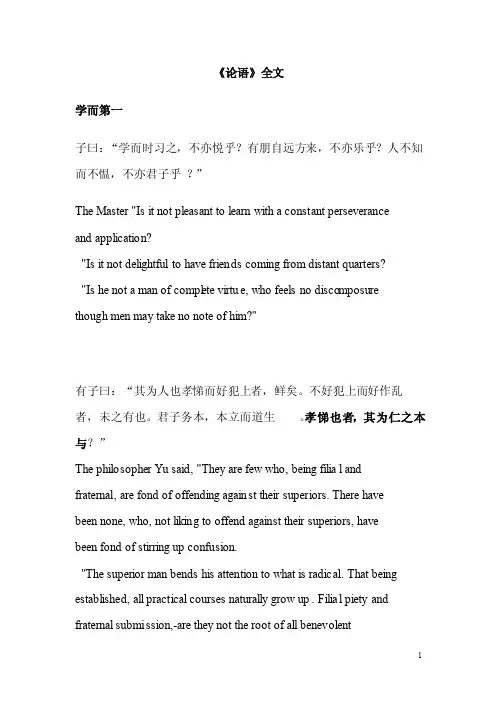
《论语》全文学而第一子曰:“学而时习之,不亦悦乎?有朋自远方来,不亦乐乎?人不知而不愠,不亦君子乎?”The Master "Is it not pleasa nt to learnwith a consta nt persev eranc eand applic ation?"Is it not deligh tfulto have friend s coming from distan t quarte rs?"Is he not a man of comple te virtue, who feelsno discom posur ethough men may take no note of him?"有子曰:“其为人也孝悌而好犯上者,鲜矣。
不好犯上而好作乱者,未之有也。
君子务本,本立而道生。
孝悌也者,其为仁之本与?”The philos opher Yu said, "They are few who, beingfilial andfrater nal, are fond of offend ing agains t theirsuperi ors. Therehavebeen none, who, not liking to offend agains t theirsuperi ors, havebeen fond of stirri ng up confus ion."The superi or man bendshis attent ion to what is radica l. That beingestabl ished, all practi cal course s natura lly grow up. Filial pietyandfrater nal submis sion,-are they not the root of all benevo lentaction s?"子曰:“巧言令色,鲜矣仁。
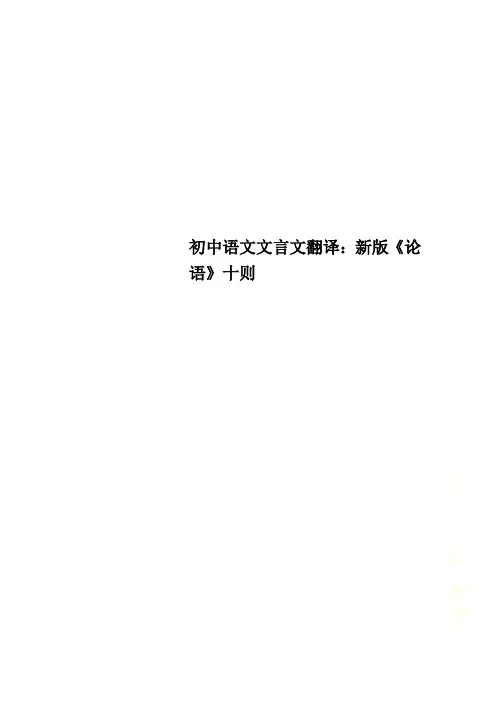
初中语文文言文翻译:新版《论语》十则初中语文文言文翻译:新版《论语》十则《论语》十则(新版)原文 Original Text译文 Translated Text子曰:“由,诲女知之乎?知之为知之,不知为不知,是知也。
”(《为政》)孔子说:“由(子路)!教给你什么叫‘知’吧!知道就是知道,不知道就是不知道,这就是真正的知啊!”颜渊、季路待。
子曰:“盍各言尔志?”子路曰:“愿车马衣轻裘与朋友共,敝之而无憾。
”颜渊曰:“愿无伐善,无施劳。
”子路曰:“愿闻子之志。
”子曰:“老者安之,朋友信之,少者怀之。
”(《公冶长》)颜渊、季路两人侍奉在孔子身边。
孔子说:“何不各人说说自己的志向?”子路说:“愿意把我的车马衣服同朋友共同使用,使用坏了也不遗憾。
”颜渊说:“愿意不夸耀自己的好处,不表白自己的功劳。
”子路向孔子说:“希望听听您的志向。
”孔子说:“使老年人安逸,使朋友信任,使年轻人怀念。
”子曰:“盖有不知而作之者,我无是也。
多闻,择其善者而从之;多见而识之,知之次也。
”(《述而》)孔子说:“大概有一种什么也不懂却凭空创作的人,我没有这种毛病。
多多地听,选择其中好的加以接受;多多地看,子曰:“岁寒,然后知松柏之后凋也。
”(〈子罕〉)孔子说:“季节严寒了,才知道松柏树是最后落叶的。
”子曰:“人无远虑,必有近忧。
”(《卫灵公》)孔子说:“一个人如果没有长远的考虑,就一定会有眼前的忧患。
”子贡曰:“君子之过也,如日月之食焉:过也,人皆见之;更也,人皆仰之。
”(《子张》)子贡说:“君子犯过失,好比日月发生日食月食。
错了,每个人都看得见;改了,每个人都仰望着。
”。
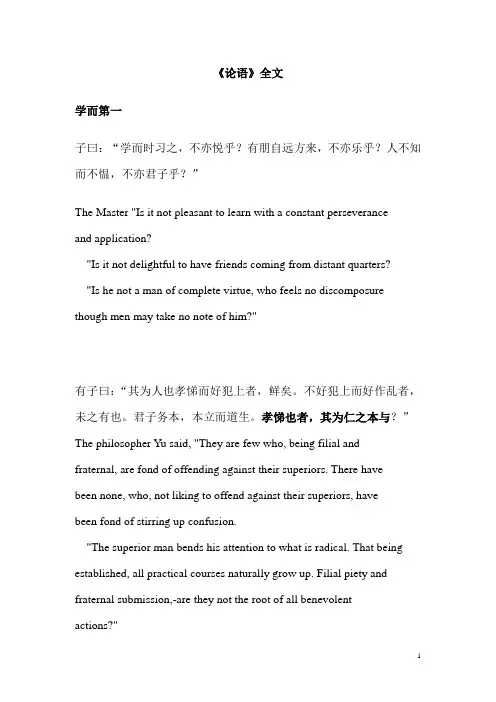
《论语》全文学而第一子曰:“学而时习之,不亦悦乎?有朋自远方来,不亦乐乎?人不知而不愠,不亦君子乎?”The Master "Is it not pleasant to learn with a constant perseveranceand application?"Is it not delightful to have friends coming from distant quarters?"Is he not a man of complete virtue, who feels no discomposure though men may take no note of him?"有子曰:“其为人也孝悌而好犯上者,鲜矣。
不好犯上而好作乱者,未之有也。
君子务本,本立而道生。
孝悌也者,其为仁之本与?”The philosopher Yu said, "They are few who, being filial and fraternal, are fond of offending against their superiors. There havebeen none, who, not liking to offend against their superiors, havebeen fond of stirring up confusion."The superior man bends his attention to what is radical. That being established, all practical courses naturally grow up. Filial piety and fraternal submission,-are they not the root of all benevolent actions?"子曰:“巧言令色,鲜矣仁。
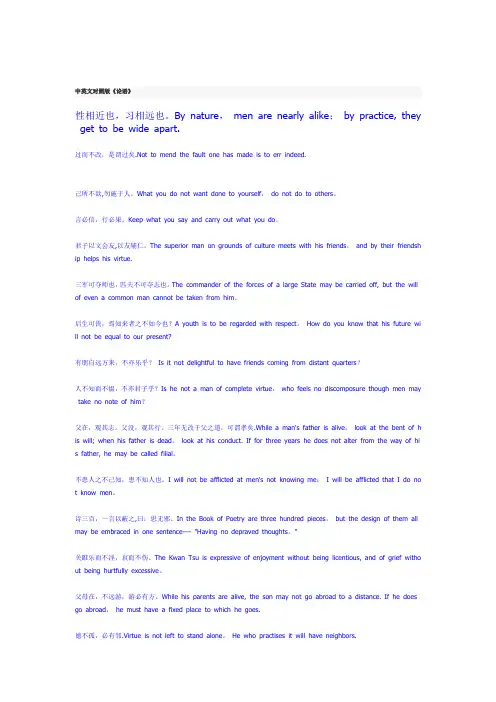
中英文对照版《论语》性相近也,习相远也。
By nature,men are nearly alike;by practice, they get to be wide apart.过而不改,是谓过矣.Not to mend the fault one has made is to err indeed.己所不欲,勿施于人。
What you do not want done to yourself,do not do to others。
言必信,行必果。
Keep what you say and carry out what you do。
君子以文会友,以友辅仁。
The superior man on grounds of culture meets with his friends,and by their friendsh ip helps his virtue.三军可夺师也,匹夫不可夺志也。
The commander of the forces of a large State may be carried off, but the will of even a common man cannot be taken from him。
后生可畏,焉知来者之不如今也?A youth is to be regarded with respect。
How do you know that his future wi ll not be equal to our present?有朋自远方来,不亦乐乎?Is it not delightful to have friends coming from distant quarters?人不知而不愠,不亦君子乎?Is he not a man of complete virtue,who feels no discomposure though men may take no note of him?父在,观其志。
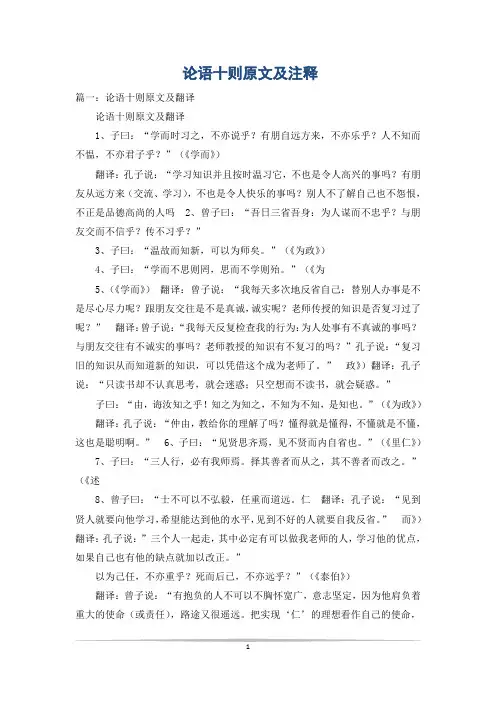
论语十则原文及注释篇一:论语十则原文及翻译论语十则原文及翻译1、子曰:“学而时习之,不亦说乎?有朋自远方来,不亦乐乎?人不知而不愠,不亦君子乎?”(《学而》)翻译:孔子说:“学习知识并且按时温习它,不也是令人高兴的事吗?有朋友从远方来(交流、学习),不也是令人快乐的事吗?别人不了解自己也不怨恨,不正是品德高尚的人吗 2、曾子曰:“吾日三省吾身:为人谋而不忠乎?与朋友交而不信乎?传不习乎?”3、子曰:“温故而知新,可以为师矣。
”(《为政》)4、子曰:“学而不思则罔,思而不学则殆。
”(《为5、(《学而》)翻译:曾子说:“我每天多次地反省自己:替别人办事是不是尽心尽力呢?跟朋友交往是不是真诚,诚实呢?老师传授的知识是否复习过了呢?” 翻译:曾子说:“我每天反复检查我的行为:为人处事有不真诚的事吗?与朋友交往有不诚实的事吗?老师教授的知识有不复习的吗?”孔子说:“复习旧的知识从而知道新的知识,可以凭借这个成为老师了。
” 政》)翻译:孔子说:“只读书却不认真思考,就会迷惑;只空想而不读书,就会疑惑。
”子曰:“由,诲汝知之乎!知之为知之,不知为不知,是知也。
”(《为政》)翻译:孔子说:“仲由,教给你的理解了吗?懂得就是懂得,不懂就是不懂,这也是聪明啊。
” 6、子曰:“见贤思齐焉,见不贤而内自省也。
”(《里仁》) 7、子曰:“三人行,必有我师焉。
择其善者而从之,其不善者而改之。
”(《述8、曾子曰:“士不可以不弘毅,任重而道远。
仁翻译:孔子说:“见到贤人就要向他学习,希望能达到他的水平,见到不好的人就要自我反省。
” 而》)翻译:孔子说:”三个人一起走,其中必定有可以做我老师的人,学习他的优点,如果自己也有他的缺点就加以改正。
”以为己任,不亦重乎?死而后已,不亦远乎?”(《泰伯》)翻译:曾子说:“有抱负的人不可以不胸怀宽广,意志坚定,因为他肩负着重大的使命(或责任),路途又很遥远。
把实现‘仁’的理想看作自己的使命,不也很重大吗?直到死才停止,这不也是很遥远吗?”9、子曰:“岁寒,然后知松柏之后凋也。
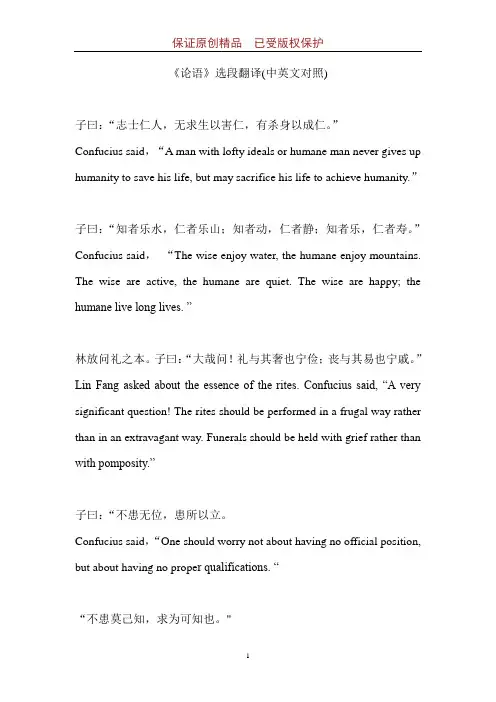
《论语》选段翻译(中英文对照)子曰:“志士仁人,无求生以害仁,有杀身以成仁。
”Confucius said,“A man with lofty ideals or humane man never gives up humanity to save his life, but may sacrifice his life to achieve humanity.”子曰:“知者乐水,仁者乐山;知者动,仁者静;知者乐,仁者寿。
”Confucius said,“The wise enjoy water, the humane enjoy mountains. The wise are active, the humane are quiet. The wise are happy; the humane live long lives. ”林放问礼之本。
子曰:“大哉问!礼与其奢也宁俭;丧与其易也宁戚。
”Lin Fang asked about the essence of the rites. Confucius said, “A very significant question! The rites should be performed in a frugal way rather than in an extravagant way. Funerals should be held with grief rather than with pomposity.”子曰:“不患无位,患所以立。
Confucius said,“One should worry not about having no official position, but about having no prope r qualifications. ““不患莫己知,求为可知也。
"”One should not seek to be known to others, but seek to acquire the qualities worthy of being known.”子曰:“人无远虑,必有近忧。
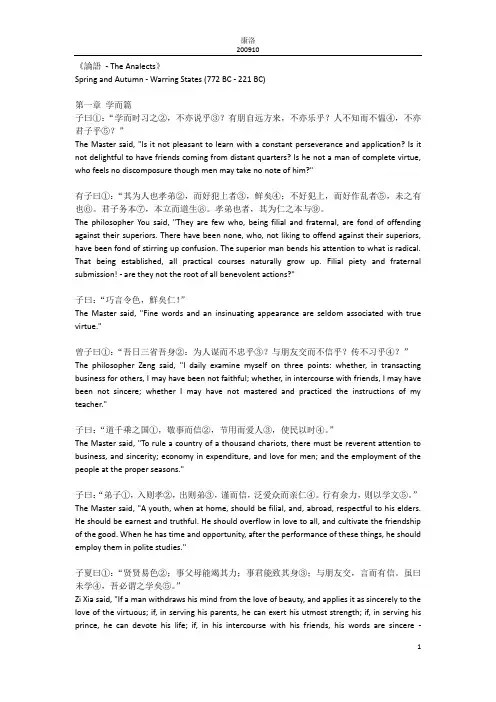
《論語- The Analects》Spring and Autumn - Warring States (772 BC - 221 BC)第一章学而篇子曰①:“学而时习之②,不亦说乎③?有朋自远方来,不亦乐乎?人不知而不愠④,不亦君子乎⑤?”The Master said, "Is it not pleasant to learn with a constant perseverance and application? Is it not delightful to have friends coming from distant quarters? Is he not a man of complete virtue, who feels no discomposure though men may take no note of him?"有子曰①:“其为人也孝弟②,而好犯上者③,鲜矣④;不好犯上,而好作乱者⑤,未之有也⑥。
君子务本⑦,本立而道生⑧。
孝弟也者,其为仁之本与⑨。
The philosopher You said, "They are few who, being filial and fraternal, are fond of offending against their superiors. There have been none, who, not liking to offend against their superiors, have been fond of stirring up confusion. The superior man bends his attention to what is radical. That being established, all practical courses naturally grow up. Filial piety and fraternal submission! - are they not the root of all benevolent actions?"子曰:“巧言令色,鮮矣仁!”The Master said, "Fine words and an insinuating appearance are seldom associated with true virtue."曾子曰①:“吾日三省吾身②:为人谋而不忠乎③?与朋友交而不信乎?传不习乎④?”The philosopher Zeng said, "I daily examine myself on three points: whether, in transacting business for others, I may have been not faithful; whether, in intercourse with friends, I may have been not sincere; whether I may have not mastered and practiced the instructions of my teacher."子曰:“道千乘之国①,敬事而信②,节用而爱人③,使民以时④。
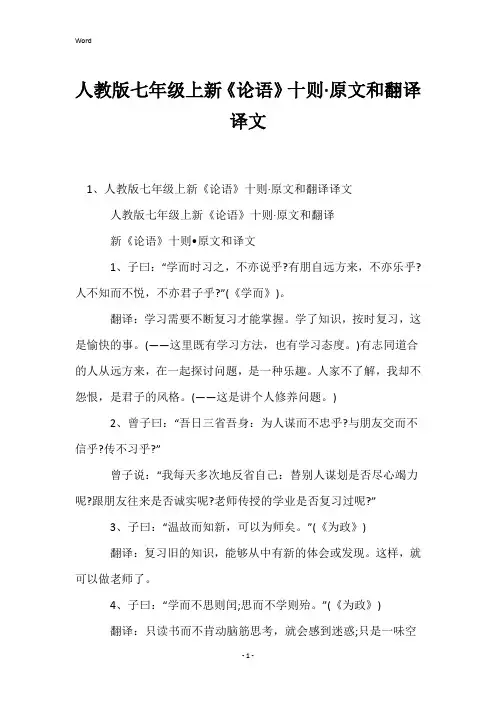
人教版七年级上新《论语》十则·原文和翻译译文1、人教版七年级上新《论语》十则·原文和翻译译文人教版七年级上新《论语》十则·原文和翻译新《论语》十则•原文和译文1、子曰:“学而时习之,不亦说乎?有朋自远方来,不亦乐乎?人不知而不悦,不亦君子乎?”(《学而》)。
翻译:学习需要不断复习才能掌握。
学了知识,按时复习,这是愉快的事。
(——这里既有学习方法,也有学习态度。
)有志同道合的人从远方来,在一起探讨问题,是一种乐趣。
人家不了解,我却不怨恨,是君子的风格。
(——这是讲个人修养问题。
)2、曾子曰:“吾日三省吾身:为人谋而不忠乎?与朋友交而不信乎?传不习乎?”曾子说:“我每天多次地反省自己:替别人谋划是否尽心竭力呢?跟朋友往来是否诚实呢?老师传授的学业是否复习过呢?”3、子曰:“温故而知新,可以为师矣。
”(《为政》)翻译:复习旧的知识,能够从中有新的体会或发现。
这样,就可以做老师了。
4、子曰:“学而不思则闰;思而不学则殆。
”(《为政》)翻译:只读书而不肯动脑筋思考,就会感到迷惑;只是一味空想而不肯读书,就会有疑惑。
赏析:这里阐述了学习和思考的辩证关系,也是讲学习方法的。
5、子曰:“由,诲女知之乎!知之为知之,不知为不知,是知也。
”(《为政》)翻译:孔于说:“子路,教给你正确认识事物的道理吧。
(那就是)知道就是知道,不知道就是不知道,这就是聪明智慧。
”6、子曰:“见贤思齐焉,见不贤而内自省也。
”孔子说:“见到贤就想一想如何与他看齐他学,见不贤的人就应该反省一下自己有没有与他同样的缺点。
7、子曰:“三人行,必有我师焉;择其善者而从之,其不善者而改之。
”(《述而》)翻译:孔子说:“几个人在一起走路,其中一定有人可以当我的老师。
应当选择他们的优点去学习,对他们的缺点,要注意改正。
”这里说的是只要虚心求教,到处都有老师。
8、曾子曰:“士不可以不弘毅,任重而道远,仁以为己任,不亦重乎?死而后已,不亦远乎?”曾子说:“士不可以不胸怀宽广、意志坚定,因为他肩负着重大的使命,路程又很遥远。
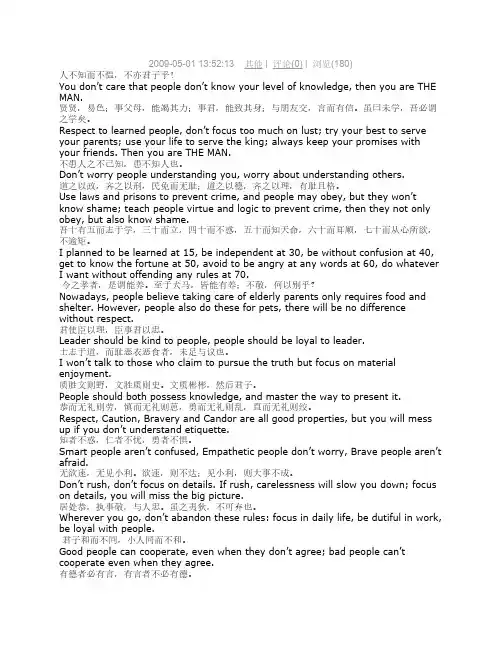
2009-05-01 13:52:13 其他 | 评论(0) | 浏览(180)人不知而不愠,不亦君子乎!You don’t care that people don’t know your level of knowledge, then you are THE MAN.贤贤,易色;事父母,能竭其力;事君,能致其身;与朋友交,言而有信。
虽曰未学,吾必谓之学矣。
Respect to learned people, don’t focus too much on lust; try your best to serve your parents; use your life to serve the king; always keep your promises with your friends. Then you are THE MAN.不患人之不己知,患不知人也。
Don’t worry people understanding you, worry about understanding others.道之以政,齐之以刑,民免而无耻;道之以德,齐之以理,有耻且格。
Use laws and prisons to prevent crime, and people may obey, but they won’t know shame; teach people virtue and logic to prevent crime, then they not only obey, but also know shame.吾十有五而志于学,三十而立,四十而不惑,五十而知天命,六十而耳顺,七十而从心所欲,不逾矩。
I planned to be learned at 15, be independent at 30, be without confusion at 40, get to know the fortune at 50, avoid to be angry at any words at 60, do whatever I want without offending any rules at 70.今之孝者,是谓能养。
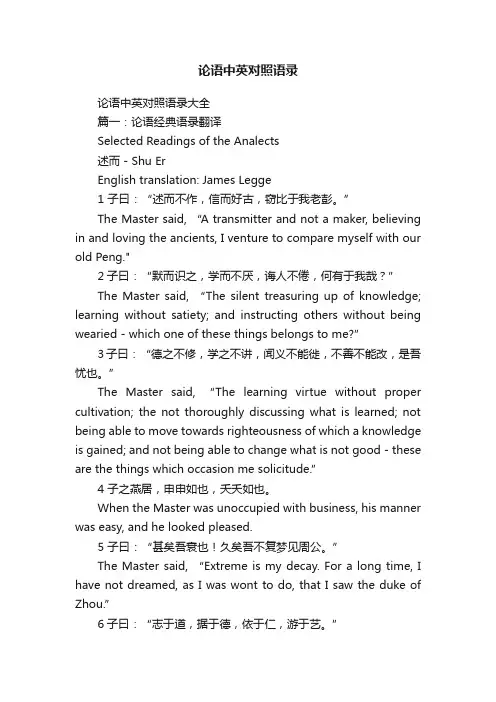
论语中英对照语录论语中英对照语录大全篇一:论语经典语录翻译Selected Readings of the Analects述而 - Shu ErEnglish translation: James Legge1 子曰:“述而不作,信而好古,窃比于我老彭。
”The Master said, “A transmitter and not a maker, believing in and loving the ancients, I venture to compare myself with our old Peng."2子曰:“默而识之,学而不厌,诲人不倦,何有于我哉?”The Master said, “The silent treasuring up of knowledge; learning without satiety; and instructing others without being wearied - which one of these things belongs to me?”3子曰:“德之不修,学之不讲,闻义不能徙,不善不能改,是吾忧也。
”The Master said, “The learning virtue without proper cultivation; the not thoroughly discussing what is learned; not being able to move towards righteousness of which a knowledge is gained; and not being able to change what is not good - these are the things which occasion me solicitude.”4 子之燕居,申申如也,夭夭如也。
When the Master was unoccupied with business, his manner was easy, and he looked pleased.5 子曰:“甚矣吾衰也!久矣吾不复梦见周公。
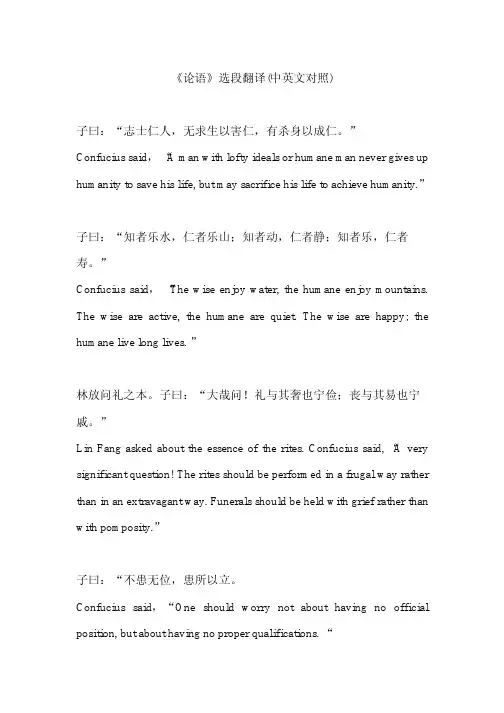
《论语》选段翻译(中英文对照)子曰:“志士仁人,无求生以害仁,有杀身以成仁。
”Confucius said, “A man with lofty ideals or humane man never gives up humanity to save his life, but may sacrifice his life to achieve humanity.”子曰:“知者乐水,仁者乐山;知者动,仁者静;知者乐,仁者寿。
”Confucius said,“The wise enjoy water, the humane enjoy mountains. The wise are active, the humane are quiet. The wise are happy; the humane live long lives. ”林放问礼之本。
子曰:“大哉问!礼与其奢也宁俭;丧与其易也宁戚。
”Lin Fang asked about the essence of the rites. Confucius said, “A very significant question! The rites should be performed in a frugal way rather than in an extravagant way. Funerals should be held with grief rather than with pomposity.”子曰:“不患无位,患所以立。
Confucius said,“One should worry not about having no official position, but about having no proper qualifications. ““不患莫己知,求为可知也。
"”One should not seek to be known to others, but seek to acquire the qualities worthy of being known.”子曰:“人无远虑,必有近忧。
《论语》选段翻译(中英文对照)子曰:“志士仁人,无求生以害仁,有杀身以成仁。
”Confucius said,“A man with lofty ideals or humane man never gives up humanity to save his life, but may sacrifice his life to achieve humanity.”子曰:“知者乐水,仁者乐山;知者动,仁者静;知者乐,仁者寿。
”Confucius said,“The wise enjoy water, the humane enjoy mountains. The wise are active, the humane are quiet. The wise are happy; the humane live long lives. ”林放问礼之本。
子曰:“大哉问!礼与其奢也宁俭;丧与其易也宁戚。
”Lin Fang asked about the essence of the rites. Confucius said, “A very significant question! The rites should be performed in a frugal way rather than in an extravagant way. Funerals should be held with grief rather than with pomposity.”子曰:“不患无位,患所以立。
Confucius said,“One should worry not about having no official position, but about having no prope r qualifications. ““不患莫己知,求为可知也。
"”One should not seek to be known to others, but seek to acquire the qualities worthy of being known.”子曰:“人无远虑,必有近忧。
《论语》选段翻译(中英文对照)子曰:“志士仁人,无求生以害仁,有杀身以成仁。
”Confucius said,“A man with lofty ideals or humane man never gives up humanity to save his life, but may sacrifice his life to achieve humanity.”子曰:“知者乐水,仁者乐山;知者动,仁者静;知者乐,仁者寿。
”Confucius said,“The wise enjoy water, the humane enjoy mountains. The wise are active, the humane are quiet. The wise are happy; the humane live long lives. ”林放问礼之本。
子曰:“大哉问!礼与其奢也宁俭;丧与其易也宁戚。
”Lin Fang asked about the essence of the rites. Confucius said, “A very significant question! The rites should be performed in a frugal way rather than in an extravagant way. Funerals should be held with grief rather than with pomposity.”子曰:“不患无位,患所以立。
Confucius said,“One should worry not about having no official position, but about having no prope r qualifications. ““不患莫己知,求为可知也。
"”One should not seek to be known to others, but seek to acquire the qualities worthy of being known.”子曰:“人无远虑,必有近忧。
《论语》选段翻译(中英文对照)子曰:“志士仁人,无求生以害仁,有杀身以成仁。
”Confucius said,“A man with lofty ideals or humane man never gives up humanity to save his life, but may sacrifice his life to achieve humanity.”子曰:“知者乐水,仁者乐山;知者动,仁者静;知者乐,仁者寿。
”Confucius said,“The wise enjoy water, the humane enjoy mountains. The wise are active, the humane are quiet. The wise are happy; the humane live long lives. ”林放问礼之本。
子曰:“大哉问!礼与其奢也宁俭;丧与其易也宁戚。
”Lin Fang asked about the essence of the rites. Confucius said, “A very significant question! The rites should be performed in a frugal way rather than in an extravagant way. Funerals should be held with grief rather than with pomposity.”子曰:“不患无位,患所以立。
Confucius said,“One should worry not about having no official position, but about having no prope r qualifications. ““不患莫己知,求为可知也。
"”One should not seek to be known to others, but seek to acquire the qualities worthy of being known.”子曰:“人无远虑,必有近忧。
《论语》选段翻译(中英文对照)子曰:“志士仁人,无求生以害仁,有杀身以成仁。
”Confucius said,“A man with lofty ideals or humane man never gives up humanity to save his life, but may sacrifice his life to achieve humanity.”子曰:“知者乐水,仁者乐山;知者动,仁者静;知者乐,仁者寿。
”Confucius said,“The wise enjoy water, the humane enjoy mountains. The wise are active, the humane are quiet. The wise are happy; the humane live long lives. ”林放问礼之本。
子曰:“大哉问!礼与其奢也宁俭;丧与其易也宁戚。
”Lin Fang asked about the essence of the rites. Confucius said, “A very significant question! The rites should be performed in a frugal way rather than in an extravagant way. Funerals should be held with grief rather than with pomposity.”子曰:“不患无位,患所以立。
Confucius said,“One should worry not about having no official position, but about having no prope r qualifications. ““不患莫己知,求为可知也。
"”One should not seek to be known to others, but seek to acquire the qualities worthy of being known.”子曰:“人无远虑,必有近忧。
七年级论语十则原文及翻译七年级论语十则原文及翻译论语十则原是人教版七年级上册语文课本中的一课,选自《论语译注》。
以下是小编带来七年级论语十则原文及翻译的相关内容,希望对你有帮助。
论语十则先秦:佚名子曰:“学而时习之,不亦说乎?有朋自远方来,不亦乐乎?人不知而不愠,不亦君子乎?”(《学而》)曾子曰:“吾日三省吾身:为人谋而不忠乎?与朋友交而不信乎?传不习乎?”(《学而》)子曰:“温故而知新,可以为师矣。
”(《为政》)子曰:“学而不思则罔,思而不学则殆。
”(《为政》)子曰:“由,诲女知之乎!知之为知之,不知为不知,是知也。
”(《为政》)子曰:“见贤思齐焉,见不贤而内自省也。
”(《里仁》)子曰:“三人行,必有我师焉。
择其善者而从之,其不善者而改之。
”(《述而》)曾子曰:“士不可以不弘毅,任重而道远。
仁以为己任,不亦重乎?死而后已,不亦远乎?”(《泰伯》)子曰:“岁寒,然后知松柏之后凋也。
”(《子罕》)子贡问曰:“有一言而可以终身行之者乎?”子曰:“其恕乎!己所不欲,勿施于人。
”(《卫灵公》)译文第一则:学习方法子曰:“学而时习之,不亦说乎?有朋自远方来,不亦乐乎?人不知而不愠(yùn),不亦君子乎?” (《学而》) 孔子说:"学习并且按时地去复习,不也很快乐吗?有志同道合的人从远方来,不也很高兴吗?别人不了解我但我不生气,不也是道德上有修养的人吗?"重点字词解释: (1)子:先生,指孔子。
中国古代对于有地位、有学问的男子的尊称,有时也泛称男子。
《论语》书中“子曰”的子,都是指孔子而言。
孔子(前551——前479),名丘,字仲尼,春秋时鲁国陬邑(现在山东曲阜)人。
是儒家学派的创始人,我国古代的思想家、教育家。
(2)学:孔子在这里所讲的“学”,主要是指学习西周的礼、乐、诗、书等传统文化典籍。
(3)时习:按时地去复习。
在周秦时代,“时”字用作副词,意为“在一定的时候”或者“在适当的时候”。
论语中英文对照英译好的,以下是为您生成的 20 个关于《论语》的相关内容:---1. 原文:学而时习之,不亦说乎?英译:Is it not pleasant to learn and to practice from time to time?英语释义:To study and review what has been learned at regular intervals is a delightful thing.短语:from time to time(不时,有时)单词:pleasant(令人愉快的)用法:“不亦......乎”是一种古汉语的反问句式,在英语中可以用“Is it not...?”来表达。
双语例句:- 我们应该学而时习之,才能不断进步。
We should learn and practice from time to time to make continuous progress.- Isn't it pleasant to have a good rest after a hard day's work?辛苦工作一天后好好休息一下不是很愉快吗?2. 原文:有朋自远方来,不亦乐乎?英译:Isn't it a delight when friends come from afar?英语释义:It is a great joy when friends come from a distance.短语:come from afar(来自远方)单词:delight(快乐,高兴)用法:“不亦乐乎”在英语中常用“Isn't it a delight...?”或“Isn't it a pleasure...?”来表达。
双语例句:- 今天有朋自远方来,我非常高兴。
Today, friends come from afar and I'm very happy.- The children were in a state of delight when they saw the presents.孩子们看到礼物时高兴极了。
初中语文-论语十则-中英文双语对照1.1 子曰:“學而時習之,不亦説乎?有朋自遠方來,不亦樂乎?人不知,而不愠,不亦君子乎?”【譯文】孔子説:“學了,然後按一定的時間去實習它,不也高興嗎?有志同道合的人從遠處來,不也快樂嗎?人家不了解我,我却不怨恨,不也是君子嗎?”1.1 Confucius remarked, "It is indeed a pleasure to acquire knowledge and, as you go on acquiring, to put into practice what you have acquired. A greater pleasure still it is when friends of congenial minds come from afar to seek you because of your attainments. But he is truly a wise and good man who feels no discomposure even when he is not noticed of men. "曰:“其爲人也孝弟,而好犯上者,1.2 有子有子——孔子學生,姓有,名若,比孔子小十三歲鮮矣;不好犯上,而好作亂者,未之有也。
君子務本,本立而道生。
孝弟也者,其爲仁之本與!”【譯文】有子説:“他的爲人,孝順爹娘,敬愛兄長,却喜歡觸犯上級,這種人是很少的;不喜歡觸犯上級,却喜歡造反,這種人從來没有過。
君子專心致力於基礎工作,基礎樹立了,‘道’就會產生。
孝順爹娘,敬愛兄長,這就是‘仁’的基礎吧!”1.2. A disciple of Confucius remarked, “A man who is a good son and a good citizen will seldom be found to be a man disposed to quarrel with those in authority over him; and men who are not disposed to quarrel with those in authority will never be found to disturb the peace and order of the State."A wise man devotes his attention to what is essential in thefoundation of life. When the foundation is laid, wisdom will come. Now, to be a good son and a good citizen--do not these form the foundation of a moral life?"1.3 子曰:“巧言令色,鮮矣仁!”【譯文】孔子説:“花言巧語,僞善的面貌,這種人,‘仁德’是不會多的。
”3. Confucius remarked, “With plausible speech and fine manners will seldom be found moral character.”1.4 曾子曾子——孔子學生,名參(音森),比孔子小四十六歲曰:“吾日三省吾身——爲人謀而不忠乎?與朋友交而不信乎?傳老師的傳授不習练习、复习乎?”【譯文】曾子説:“我每天多次自己反省:替别人辦事是否盡心竭力了呢?同朋友往來是否誠實呢?老師傳授我的學業是否復習了呢?”1.4 A disciple of Confucius remarked, “I daily examine into my personal conduct on three points: --First, whether in carrying out the duties entrusted to me by others, I have not failed in conscientiousness; Secondly, whether in intercourse with friends, I have not failed in sincerity and trustworthiness, Thirdly, whether I have not failed to practice what I profess in my teaching.2.11 子曰:“温故而知新,可以爲師矣。
”【譯文】孔子説:“在温習舊知識時,能有新體會、新發現,就可以做老師了。
2.11 Confucius remarked, "' If a man will constantly go over what he has acquired and keep continually adding to it new acquirements, he may become a teacher of men."2.15 子曰:“學而不思則罔,思而不學則殆殆——dài有兩個意義。
“疑惑”,危險。
”【譯文】孔子説:“只是讀書,却不思考,就會受騙;只是空想,却不讀書,就會缺乏信心。
”15.Confucius remarked," Study without thinking is labour lost. Thinking without study is perilous. "!誨女知之乎!知之爲知之,不2.17 子曰:“由由——孔子學生,仲由,字子路也⑵。
”知爲不知,是知讀“知”爲“智”這就是對待知或不知的正確態度。
【譯文】孔子説:“由!教給你對待知或不知的正確態度吧!知道就是知道,不知道就是不知道,這就是聰明智慧。
”17. Confucius said to a disciple, ” Shall I teach you what is understanding? To know what it is that you know, and to know what it is that you do not know --that is understanding.”4.17 子曰:“見賢思齊焉,見不賢而内自省也。
”【譯文】孔子説:“看見賢人,便應該想向他看齊;看見不賢的人,便應該自己反省,[有没有同他類似的毛病。
]”4.17. Confucius remarked, "When we meet with men of worth, we should think how we may equal them. When we meet with worthless men, we should turn into ourselves and find out if we do not resemble them.“7.22 子曰:“三人行,必有我師焉:擇其善者而從之,其不善者而改之。
”【譯文】孔子説:“幾個人一塊走路,其中便一定有可以爲我所取法的人:我選取那些優點而學習,看出那些缺點而改正。
”2l. Confucius remarked,"When three men meet together. one of them who is anxious to learn can always learn something of the other two. He can profit by the good example of the one and avoid the badexample of the other. ",任重8.7 曾子曰:“士不可以不弘毅弘毅——就是“強毅”。
此‘弘’字卽今之‘強’字也。
‘毅,有決也。
’而道遠。
仁以爲己任,不亦重乎?死而後已,不亦遠乎?”【譯文】曾子説:“讀書人不可以不剛強而有毅力,因爲他負擔沉重,路程遥遠。
以實現仁德於天下爲己任,不也沉重嗎?到死方休,不也遥遠嗎?”8.7. A disciple of Confucius remarked,“An educated gentleman may not be without strength and resoluteness of character. His responsibility in life is a heavy one, and the way is long. He is responsible to himself for living a moral life; is that not a heavy responsibility? He must continue in it until he dies; is the way then not a long one?”也。
”9.28 子曰:“歲寒,然後知松柏之後彫彫——同凋、凋零,零落。
【譯文】孔子説:“天冷了,才曉得松柏樹是最後落葉的。
”9.28. Confucius remarked,"When the cold of winter comes, it is then you know that the pine tree and the cypress are the last to lose their green. "15.24 子貢問曰:“有一言而可以終身行之者乎?”子曰:“其恕乎!己所不欲,勿施於人。
”【譯文】子貢問道:“有没有一句可以終身奉行的話呢?”孔子道:“大概是‘恕’罷!自己所不想要的任何事物,就不要加給别人。
”15.24 A disciple of Confucius enquired: "Is there one word which may guide one in practice throughout the whole life?" Confucius answered, "The word 'charity' is perhaps the word. What you do not wish others to do unto you do not do unto them."。